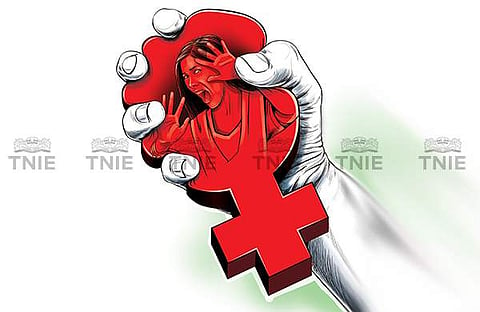Four Dalit women are raped every day, with several on multiple occasions
Bhojlal, a septuagenarian and a Dalit near Thanagazi, is visibly traumatised at the gang rape of a young woman from the same community he belongs to—Balai. Every day since last week, he makes a round to the Thanagazi police station—not far from his house—to check on the development in the case.
He recalls how some decades back it was almost a way of life for “dabang” (strong) men of the villages in the area to abduct young girls belonging to low castes whenever they pleased. “They would keep them for days and rape them till they wanted. When the girls would return, her family would take solace that at least she had returned alive,” he says. “Not much has changed. Dalit women continue to be targeted because they are seen as the weakest of the weak.”
Statistics confirm what Bhojlal believes. Dalit women indeed are at the bottom of the bottom. Of all crimes committed against the members of the Scheduled Castes, the highest are against Dalit women—the 2016 National Crime Records Bureau, the last data released nationally, show. Assaults on SC women to outrage her modesty, rapes, attempts to commit rapes and insults to the modesty of SC women consist of lion’s share of all cases against Dalits.
“And this is just tip of the iceberg because most of the crimes against dalit women are never even reported,” says Ranjana Kumari of the Centre for Social Studies. “If you are woman in India and poor and a Dalit—then there is no position worse than that.”The NCRB data also suggests that more than four Dalit women are raped every day. The National Campaign on Dalit Human Rights, an NGO, says over 23% of Dalit women report being raped, and many have reported multiple instances of rape. Many perpetrators commit sexual crimes with a sense of impunity, said Mariam Dhawale, general secretary of the All India Democratic Women’s Association, pointing to abysmally low conviction rates and a lack of legal protection for the victims.
“And it’s particularly troubling that the sense of authority among the self-appointed gangs in the society is increasing as crimes against the marginalised are getting a legitimacy not seen before.”She adds that in the election season as the incident hit the headlines nationally, there is a chance of the survivor getting justice in the case but all are not so lucky.
Indu Agnihotri of the Centre for Women Development Studies, however, has a problem with the politicisation of the Alwar gang rape. “This kind of political attention often leads to community mobilisation that helps political parties electorally but I am not sure it will ensure speedy justice in the case.” Agnihotri, however, is also happy at the resistance shown by Dalits in heinous crimes of late.
“It’s heartening to see the resolution shown by many survivors or victims to seek justice.”
Dalit women are the weakest of the weak
Dalit women are at the bottom of the bottom. Of all crimes committed against the members of the Scheduled Castes, the highest are against Dalit women
Assaults on SC women to outrage her modesty, rapes, attempts to commit rapes and insults to modesty of SC women consist of lion’s share of all cases

